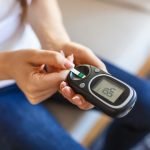The hidden link between dehydration and high blood pressure
Imagine your body as a bustling city, with highways of blood vessels and a heart that keeps traffic moving.
Now, picture what happens when this...
How to spot type 2 diabetes early
Type 2 diabetes is a health condition that affects how your body turns food into energy. It's a common issue, but the good news...
Acute kidney injury vs. chronic kidney disease: what is the difference?
When it comes to kidney health, two terms often cause confusion: acute kidney injury (AKI) and chronic kidney failure (CKF).
While both conditions affect the...
Walking about 4000 steps could help prevent heart failure
A recent study conducted by the University at Buffalo has shed new light on the optimal amount of physical activity for older women, challenging...
Vaping can increase risk of COVID-19
In a revealing study conducted by researchers at the University of California, Riverside, it's been discovered that vaping, the act of inhaling vapor produced...
Vaccines and their surprising role in reducing Alzheimer’s risk
In the ongoing battle against Alzheimer's disease, a condition that slowly strips away memory and cognitive abilities, scientists are constantly on the lookout for...
The link between sleep apnea and high blood pressure
High blood pressure, or hypertension, and sleep apnea are more connected than most people realize.
While high blood pressure is a condition that makes your...
The link between pancreas and diabetes you need to know
In the grand tapestry of the human body, where each organ plays a unique and vital role, the pancreas might seem like a modest...
Stress tests and heart health: Understanding the connection
When it comes to heart health, doctors have a variety of tools at their disposal to diagnose and assess the condition of your heart.
One...
Scientists find a big cause of urinary tract infections (UTI) and better treatment
Urinary tract infections (UTIs), especially cystitis, are a common yet painful reality for one in two women at some point in their lives. Many...










